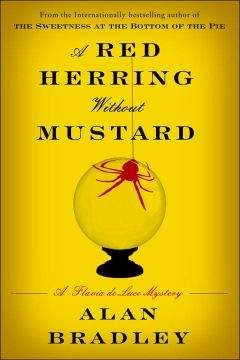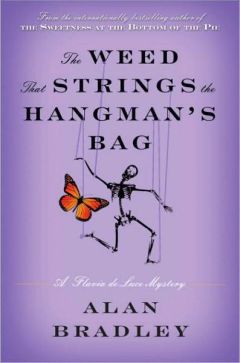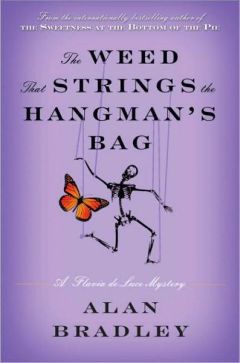Alan Bradley - A Red Herring Without Mustard: A Flavia de Luce Novel

Скачивание начинается... Если скачивание не началось автоматически, пожалуйста нажмите на эту ссылку.
Жалоба
Напишите нам, и мы в срочном порядке примем меры.
Описание книги "A Red Herring Without Mustard: A Flavia de Luce Novel"
Описание и краткое содержание "A Red Herring Without Mustard: A Flavia de Luce Novel" читать бесплатно онлайн.
It was time to ingratiate myself.
Without a word I went to the sink and wetted a hand towel. I wrung it out and gave it to her. As she wiped the blood from her face and hands, I looked away discreetly, taking the opportunity to examine the kitchen.
It was a square room with a low ceiling. A small green Aga crouched in the corner and there was a plain, scrubbed deal table with a single chair: the one in which Miss Mountjoy was presently sitting. A plate rail ran round two sides of the room, upon which were displayed an assortment of blue and white plates and platters—mostly Staffordshire, by the look of them: village greens and country scenes, for the most part. I counted eleven, with an empty space about a foot and a half in diameter where a twelfth plate must once have hung.
Filtered through the willow branches outside, the weak green light that seeped in through the two small windows above the sink gave the plates a weird and watery tint, which reminded me of what the Trafalgar Lawn had looked like after the rain: after the taking down of Brookie’s body from the Poseidon fountain.
At the entrance to the narrow passage through which we had entered the kitchen was a chipped wooden cabinet, on top of which was a cluster of identical bottles, all of them medicinal-looking.
Only as I read their labels did the smell hit me. How odd, I thought: the sense of smell is usually lightning fast, often speedier than that of sight or hearing.
But now there was no doubt about it. The whole room—even Miss Mountjoy herself—reeked of cod-liver oil.
Perhaps until that moment the sight of Miss Mountjoy’s nosebleed and her blood-splattered clothing had overwhelmed my sense of smell. Although I had first noticed the fishy odor when I saw her dripping blood at the door, and again when I had applied the cold key to the nape of her neck, my brain must have labeled the fact as not immediately important, and tucked it away for later consideration.
My experience of cod-liver oil was vast. Much of my life had been spent fleeing the oncoming Mrs. Mullet, who, with uncorked bottle and a spoon the size of a garden spade, pursued me up and down the corridors and staircases of Buckshaw—even in my dreams.
Who in their right mind would want to swallow something that looked like discarded engine oil and was squeezed out of fish livers that had been left to rot in the sun? The stuff was used in the tanning of leather, and I couldn’t help wondering what it would do to one’s insides.
“Open up, dearie,” I could hear Mrs. Mullet calling as she trundled after me. “It’s good for you.”
“No! No!” I would shriek. “No acid! Please don’t make me drink acid!”
And it was true—I wasn’t just making this up. I had analyzed the stuff in my laboratory and found it to contain a catalogue of acids, among them oleic, margaric, acetic, butyric, fellic, cholic, and phosphoric, to say nothing of the oxides, calcium and sodium.
In the end, I had made a bargain with Mrs. M: She would allow me to take the cod-liver oil alone in my room at bedtime, and I would stop screaming like a tortured banshee and kicking at her ankles. I swore it on my mother’s grave.
Harriet, of course, had no grave. Her body was somewhere in the snows of Tibet.
Happy to be relieved of a difficult and unwanted task, Mrs. Mullet had pretended to be scandalized, but cheerfully handed over both spoon and bottle.
My mind came snapping back to the present like a rubber ball on an elastic string.
“Trouble with antiques, was it?” I heard myself say. “You’re not alone in that, Miss Mountjoy.”
Although I almost missed it, her rapid glance upwards, towards the spot where the missing plate had hung, told me I had hit the bull’s-eye.
She saw me following her gaze.
“It was from the time of Hongwu, the first Ming emperor. He told me he knew a man—”
“Brookie?” I interrupted.
She nodded.
“He said he knew someone who could have the piece assessed discreetly, and at reasonable cost. Things have been difficult since the war, you see, and I thought of—”
“Yes, I know, Miss Mountjoy,” I said. “I understand.”
With Father’s financial difficulties, and the blizzard of past-due accounts that arrived with every postal delivery being the subject of much idle chitchat in Bishop’s Lacey, there was no need for her to explain her own poverty.
Her look formed a bond between us. “Partners in debt,” it seemed to say.
“He told me the railway had broken it. He’d packed the plate in straw, he said, and put it in a barrel, but somehow—he’d taken out no insurance, of course, trying to keep expenses down—trying not to burden me with additional—and then—”
“Someone spotted it in an antiques shop,” I blurted.
She nodded. “My niece, Julia. In Pimlico. She said, ‘Auntie, you’ll never guess what I saw today: the mate to your Ming!’
“She was standing right there where you are, and just as you did, she looked up and saw the empty space on the shelf. ‘Oh, Auntie!’ she said. ‘Oh, Auntie.’
“We tried to get the plate back, of course, but the man said he had it on consignment from an MP who lived in the next street. Couldn’t give out names because of confidentiality. Julia was all for going to the police, but I reminded her that Uncle Jamieson, who brought the piece into the family, was not always on the up-and-up. I’m sorry to have to tell you that story, Flavia, but I’ve always made it a point to be scrupulously honest.”
I nodded and gave her a little look of disappointment. “But Brookie Harewood,” I said. “How did he come to get his hands on the plate?”
“Because he’s my tenant. He lives in my coach house, you see.”
Brookie? Here? In Miss Mountjoy’s coach house? This was news to me.
“Oh, yes,” I said. “Of course he does. I’d forgotten. Well, then, I’d better be getting along. I think you’d best lie down for a while, Miss Mountjoy. You’re still quite pale. A nosebleed takes so much out of one, doesn’t it? Iron, and so forth. You must be quite worn out.”
I led her to the little parlor I had seen at the front of the house and helped her recline on a horsehair settee. I covered her with an afghan, and left her clutching at it with white fingers.
“I’ll see myself out,” I said.
ELEVEN
LIKE AN ACTOR IN the pantomime muddling his way out from behind the curtains, I pushed aside the hanging willow branches and stepped out from the green gloom and into the blinding glare of the sun’s spotlight.
Time was running out. Inspector Hewitt and his men were probably minutes away and my work was hardly begun.
Since Brookie’s van was directly in front of me, I’d begin there. I glanced quickly up and down the street. There was no one in sight.
One of the van’s windows was rolled all the way down: obviously just as Brookie had left it. Here was a bit of luck!
Father was always going on about the importance of carrying a handkerchief at all times, and for once he was right. Opening the door would leave my fingerprints on the nickel-plated handle. A clean bit of linen was just the ticket.
But the handle wouldn’t budge, although it did give off an alarming groan that hinted of extensive rust beneath. One thing that I didn’t need was to have a van door fall off and go clattering into the street.
I stepped up onto the running board (another metallic groan) and used my elbows to lever myself into position. With my stomach on the bottom of the window frame, I was able to hinge the top half of my body into the van, leaving my legs and feet sticking straight out in the air for balance.
With the handkerchief wrapped round my hand, I pressed on the glove compartment’s release button, and when it popped open, reached inside and pulled out a small packet. It was, as I thought it might be, the registration papers for the van.
I almost let out a cheer! Now I would find out Brookie’s real address, which I somehow doubted would be Willow Villa.
Edward Sampson, the document said. Rye Road, East Finching.
I knew well enough where East Finching was: It lay about five miles by road to the north of Bishop’s Lacey.
But who was Edward Sampson? Other than being the owner of the van from which my bottom was probably projecting like a lobster’s claw from a trap—I hadn’t the faintest idea.
I shoved the papers back into the glove compartment and pushed home the panel.
Now for the coach house.
“Come along, Gladys,” I said, taking her from where she had been waiting. No sense having my presence detected by leaving her parked in plain view.
Because of the peculiar shape of Miss Mountjoy’s property, the coach house was located at the end of a hedge-lined L-shaped lane that ran along one side and across the back. I tucked Gladys out of sight behind a box hedge and proceeded on foot.
As I approached the building, I could see that the term “coach house” was no more than a courtesy title. In fact, it was almost a joke.
The building was square, with bricks on the bottom floor and boards on the top. The windows were coated with the kind of opaque film that tells of neglect and cobwebs; the kind of windows that watch you.
The door had once been painted, but had blistered away to reveal gray, weathered wood that matched the un-painted boards of the upper story.
I wrapped my hand in the handkerchief and tried the latch. The door was locked.
The first-floor windows were too high to gain entry, and the tangle of ivy on a broken trellis too fragile to climb. A rickety ladder leaned wearily against the wall, too dangerous to be pressed into service. I decided to try round the back.
I had to be careful. Only a sagging wooden fence and a narrow walkway separated the rear of the coach house from Miss Mountjoy’s overhanging willow tree: I’d have to crouch and run, like a commando on the beach.
At the end of the fence, on the left side of the walkway, was a wire compound attached to the coach house, from which issued, as I approached, an excited clucking. Inside the compound, there was a cage no more than two feet high—rather less, in fact—and in it was the biggest rooster I had ever seen: so large that he had to strut about his cage with stooped shoulders.
As soon as he saw me the bird made for the wires that separated us, fluttering up towards my face with a frightening rustle of wings. My first instinct was to take to my heels—but then I saw the pleading look in his marmalade eye.
He was hungry!
I took a handful of feed from a box that was nailed to the framework of the cage and tossed it through the mesh. The rooster fell upon the stuff like a wolf upon Russian travelers, his comb, as red as paper poppies, bobbing busily up and down as if it were driven by steam.
As he feasted, I noticed a hatch on the far side of the cage that opened into the coach house. It was no more than rooster-sized, but it would do.
Throwing a couple more handfuls of feed to distract the bird, I turned to the wire fence. It was only about seven feet high, but too far to leap up and grasp the upper frame. I tried to swarm up the mesh, but my shoes could find no grip.
Undefeated, I sat down and removed my shoes and socks.
When I come to write my autobiography, I must remember to record the fact that a chicken-wire fence can be scaled by a girl in bare feet, but only by one who is willing to suffer the tortures of the damned to satisfy her curiosity.
As I climbed, my toes stuck through the hexagons of the wire mesh, each strand like the blades of a cheese cutter. By the time I reached the top, my feet felt as if they belonged to Scott of the Antarctic.
As I dropped to the ground on the inside of the enclosure the rooster made a lunge for me. Since I hadn’t thought to bring a pocketful of feed to appease the famished bird, I was at his mercy.
He threw himself at my bare knees and I made a dive for the hatchway.
It was a tight fit, and I could only squirm my way painfully through the opening as the enraged bird pecked furiously at my legs—but moments later I was inside the coach house: still inside a wired partition, but inside.
And so was the rooster, who had followed me in, and was now flinging himself upon me like an avenging fury.
Seized by a sudden inspiration, I squatted, caught the bird’s eye, then with a loud hissing, rose up suddenly to my full height, weaving my head and flicking my tongue in and out like a king cobra.
It worked! In his feeble rooster brain, some age-old instinct whispered a sudden, wordless tale of terror that involved a chicken and a snake, and taking to his heels, he shot out through the hatch like a feathered cannonball.
I poked my fingers through the mesh and rotated the strip of wood that served as a latch, then stepped into the corridor.
I suppose my mind had been filled with images of dusty box stalls, of shriveled harness hanging from wooden pegs, of currycombs and benches, and perhaps a long-abandoned phaeton carriage lurking in some dim corner. Perhaps I was thinking of our own coach house at Buckshaw.
But whatever the case, I was totally unprepared for what I saw.
Beneath the low, beamed ceiling of what had once been a stable, couches upholstered in green and pink silk were jammed together like buses in Piccadilly Circus. Cameo jars and vases—some of them surely Wedgwood—stood here and there on tables whose old wood managed to glow even in the dim light. Carved cabinets and elaborately inlaid tables receded into the shadows, while nearby horse stalls overflowed with Royal Albert ewers and Oriental screens.
The place was a warehouse—and, I thought, no ordinary one at that!
Against one wall, almost hidden by a massive sideboard, was an exquisitely carved Georgian chimneypiece, in front of which, half-unrolled, was a rich and elaborate carpet. Something very much like it had been pointed out to me on more than one occasion by Feely’s friend and toady, Sheila Foster, who managed to drag their carpet into even the most casual conversation: “The Archbishop of Canterbury was down for the weekend, you know. As he was pinching my cheek, he dropped a crumb of his Dundee cake on our dear old Aubusson.”
I had just stepped forward to have a closer look at the thing when something caught my eye: a gleam in a dark corner by the chimneypiece. I sucked in my breath, for there in Miss Mountjoy’s coach house stood Sally Fox and Shoppo—Harriet’s brass fire irons!
What on earth—? I thought. How can this be?
I had seen the firedogs just hours before in the drawing room at Buckshaw. Brookie Harewood couldn’t possibly have crept back into the house and stolen them because Brookie was dead. But who else could have brought them here?
Could it have been Colin Prout? Colin was, after all, Brookie’s puppet, and I had found him hanging about the neighborhood just minutes ago.
Did Colin live here with Brookie? Miss Mountjoy had referred to Brookie as her tenant, which surely meant that he lived here. I hadn’t seen any sign of a kitchen or sleeping quarters, but perhaps they lay somewhere beyond the vast expanse of furniture or upstairs on the first floor.
Подписывайтесь на наши страницы в социальных сетях.
Будьте в курсе последних книжных новинок, комментируйте, обсуждайте. Мы ждём Вас!
Похожие книги на "A Red Herring Without Mustard: A Flavia de Luce Novel"
Книги похожие на "A Red Herring Without Mustard: A Flavia de Luce Novel" читать онлайн или скачать бесплатно полные версии.
Мы рекомендуем Вам зарегистрироваться либо войти на сайт под своим именем.
Отзывы о "Alan Bradley - A Red Herring Without Mustard: A Flavia de Luce Novel"
Отзывы читателей о книге "A Red Herring Without Mustard: A Flavia de Luce Novel", комментарии и мнения людей о произведении.






